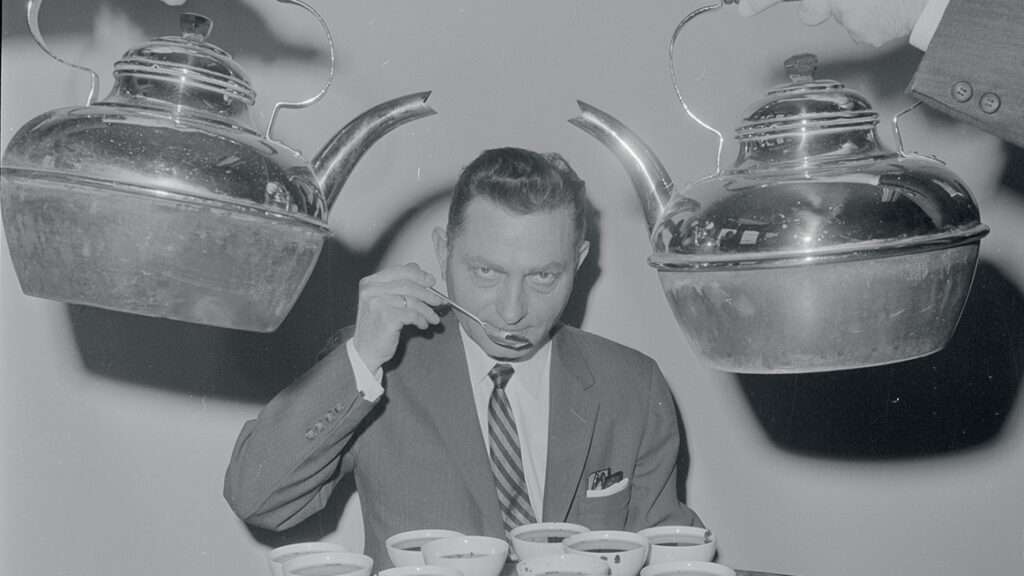“I see no cause,” the late Sen. Harry Reid (D–Nev.) as soon as declared on the Senate flooring, “why these on this nation who take pleasure in ingesting tea want another person to inform them what tastes good.”
But for practically 100 years that’s precisely what the federal government did, because of one of many strangest businesses ever to be part of the federal forms.
Along with the same old beverage rules geared toward making certain correct storage and secure dealing with, imported tea was required for many years to go a literal style take a look at earlier than it may very well be offered in the USA. The duty fell to a bunch of Meals and Drug Administration (FDA) appointees, who would collect yearly in a transformed Navy warehouse in Brooklyn to odor, slosh, sip, and spit the assorted oolongs, greens, and Earl Greys that tea retailers sought to promote to People.
This was the federal Board of Tea Specialists.
The board’s members would style dozens of teas over the course of a number of days. The method was extra an artwork than a science. In response to a 1989 Washington Publish profile, there was no uniform technique for tasting. Some board members labored in silence whereas others slurped their tea or gargled it loudly. Some most well-liked to style the tea scorching; others let it cool first. The warehouse the place they gathered was outfitted with photos of old-timey crusing ships, a kitchen sink, a number of kettles for boiling water, packing containers upon packing containers of tea, and enormous home windows. The board’s then-leader Robert H. Dick advised the Publish thatto correctly examine the tea, “I’ve to have a north mild.”
When Reid voiced his objection to the tea board in 1995, the company had already survived 20 years’ price of efforts to close it down. Congress lastly ended the board’s oversight of tea imports a 12 months later, however the federal Board of Tea Specialists technically nonetheless existed for an additional 27 years. It was formally terminated on September 19, 2023.
The weird historical past and shocking longevity of the federal tea-tasting board is one thing of a blended bag for anybody who needs to see extra federal packages iced for good.
On one hand: The board was ultimately shut down.
On the opposite: If it takes practically 50 years to do away with one thing as ineffective and insignificant because the Board of Tea Specialists, what hope can there presumably be to get rid of bigger governmental entities backed by extra highly effective particular pursuits? Hardly an election season goes by with out some (often Republican) presidential hopefuls promising to abolish this division or that company—the Division of Training and the Environmental Safety Company are perennial favorites. Are these efforts doomed earlier than they start? Will these guarantees all the time be empty?
The bizarre story of the Board of Tea Specialists holds a wide range of classes for anybody eager about shrinking the dimensions and scope of presidency. It is a warning concerning the stickiness of dangerous concepts, about an inertia that may restrict even the smallest makes an attempt at trimming the state.
“That is the rationale persons are upset about authorities,” Reid stated in that 1995 Senate flooring speech. “What an absolute waste of taxpayers’ cash is it to have them spend $200,000 a 12 months swishing tea round of their mouths.”
A Tea Board Is Born
Anthropologists consider human beings have been ingesting tea earlier than recorded historical past. In China, the place tea was first cultivated, accounts of the drink’s advantages for retaining wholesome and staying awake date again not less than so far as the Shang dynasty (based round 1700 B.C.); bodily proof of tea consumption and the tea commerce goes again effectively over 2,000 years.
The connection between tea and the state is historical too. In response to one Chinese language legend, the drink was invented when leaves have been by accident blown right into a cup belonging to Emperor Shennong, who was keen on sipping boiled water. The ensuing brew tasted good, and presumably gave the mythic ruler considered one of humanity’s first caffeine highs.
Tea made its solution to Europe (after which the Americas) within the 1600s. A 1657 itemizing from a London espresso store provided tea on the market beginning at 16 shillings per pound—roughly $190 per pound in the present day. Governments all around the world tried to subsidize and monopolize the tea commerce at varied occasions, and plenty of collected bountiful income from their residents’ and colonists’ addictions.
Within the New World, that quest for income helped spark a history-altering backlash. The rebellion in Boston Harbor on the evening of December 16, 1773, wasn’t the primary tax revolt in American historical past, and it would not be the final. Nevertheless it stays probably the most memorable, and an important a part of the nation’s founding mythology. The lingering cultural reminiscence of the Boston Tea Occasion might need even performed an oblique function within the creation of the federal Board of Tea Specialists greater than a century later.
“Because the British drank lots of tea, they’d choose the perfect teas, after which lots of occasions after they had one thing they did not need, that was left over, or perhaps even broken or one thing, they’d fill the order from the USA with a few of that tea,” Dick, whose tenure on the Board of Tea Specialists lasted from 1947 till 1996, defined in a 1984 interview printed as a part of an inner historical past of the FDA.
Nervous that British tea exporters have been making the most of their much less subtle American clients, Congress handed the Tea Importation Act of 1897. The act created a brand new federal fee charged with making certain the standard of the nation’s tea provides. However from the beginning, the board’s requirements appear to have been fairly open to interpretation. When the Tea Importation Act was first handed, it merely stated “that the tea ought to be rejected if it was unfit,” Dick defined in that interview. “Effectively, unfit meant various things to completely different folks.”
Over time, tasting requirements for various kinds of tea have been put into place. Imported tea needed to match the federally authorized taste profiles to be legally offered, with the tasters accountable for setting the requirements. After the FDA was created in 1906, the tea-tasting board was rolled into the brand new company, which might ultimately develop to control cosmetics, prescribed drugs, and, in fact, meals. However the Board of Tea Specialists remained a novel factor of the FDA’s sprawling portfolio. “Tea is the one meals or beverage for which the [FDA] samples each lot upon entry for comparability to an ordinary really useful by a federal board,” famous a 1996 evaluation from the Home of Representatives.
Because the Publish detailed in its 1989 profile, the annual gathering of the tea-tasters was not meant to determine the perfect teas or set notably excessive requirements for what could be allowed into the nation. Quite, “the duty is to pick out the worst which might be nonetheless drinkable” after which use these requirements as the premise for what could be permitted to enter the nation for the remainder of the 12 months. On the top of its imprecise but absolute powers, the tea board employed testers primarily based in Boston, New York, and San Francisco; their job was to translate the board’s requirements into follow. A separate however associated entity, the Board of Tea Appeals, supplied due course of for anybody wronged by the tea-tasters’ opinions.
Even with some requirements in place, bureaucratic laziness typically prevailed. At one level, Dick recollects being advised by a then-senior member of the board that “you do not want to have a look at all of these teas as a result of you may take a look at the costs and you’ll inform which is the nice tea and which is the dangerous tea.” Too dangerous customers could not be trusted to do the identical.
If the board was defending customers, it does not appear to have been defending them from a lot—the board rejected lower than 1 p.c of the teas submitted for approval annually. However Dick argued the mere threatof rejection was a safety.
“For those who remove the Tea Act then you definitely’ve bought a case of the place any individual goes to take possibilities,” Dick stated in 1984. “If they’ve a poor tea, they do not know whether or not it is going to be rejected or not, and they do not know whether or not it will be sampled or not, they usually could also be tempted to ship it. So, it will make a distinction.”
There’s a lengthy historical past of home industries utilizing made-up or exaggerated considerations about client security to hunt political energy, then utilizing that energy to restrict competitors or create cartels. It is tempting to venture that narrative onto the historical past of the Board of Tea Specialists.
However there’s an issue with that principle, says Ryan Younger, a senior economist on the pro-market Aggressive Enterprise Institute. There was not a lot of a home tea manufacturing trade within the Nineties. Even in the present day, the overwhelming majority of tea consumed in the USA comes from overseas, primarily India and China.
There might have been reliable causes to fret concerning the high quality of tea being imported into the U.S. on the time the board was created, says Younger. Nevertheless it was non-public trade, not authorities, that solved it.
“Again then, groceries have been typically offered out of crates and barrels, typically with no solution to know who the producer was or the place the product got here from,” he says. “Manufacturers are an especially essential self-regulation gadget in markets. They enhance belief and accountability, whereas nameless producers can get away with all kinds of shenanigans.”
By the center of the twentieth century, non-public self-regulation had solved the issue that the Board of Tea Specialists was supposed to repair.
However authorities packages do not simply go away after they develop into out of date.


The Lengthy, Gradual Dying of the Tea Board
Can ingesting tea enable you reside longer? Some research recommend as a lot. Analysis printed in Advances in Diet in 2020 discovered that common consumption of tea is correlated with a decrease danger of dying from varied cardiovascular points, together with strokes. The research’s authors attributed tea drinkers’ longer life spans to “flavonoids”—a pigment discovered in lots of tea leaves that’s regarded as a robust antioxidant.
I do know of no peer-reviewed research suggesting authorities bureaucracies tasked with tea tasting have longer than common life spans. However the out there proof means that, certainly, they’re fairly tough to kill.
“These tea-tasting persons are similar to lizards,” Sen. Reid declared in 1995, evaluating the board to critters he stated he’d catch as a child, ones whose tails would develop again even after they have been yanked off. “You seize them and jerk one thing off and they’re proper again.”
By then, the Board of Tea Specialists had survived greater than a quarter-century with a goal on its again.
The primary try and remove the tea board occurred in 1970, when the Nixon administration tried to redirect the board’s price range of $125,000 (nearly $1 million in the present day) to different components of the FDA. Nixon was searching for a straightforward public relations coup, based on a up to date New York Instances report. Killing off the tea-tasting board could be a logo of the federal authorities’s dedication to belt tightening, or so he thought.
The tea trade fought for the board’s survival, arguing that the president had no energy to empty the board’s price range except Congress first repealed the 1897 regulation that approved it. With Congress apparently uninterested, Nixon quietly surrendered.
The try not less than supplied one lasting second of hilarity. Whereas digging by way of packing containers of paperwork on the Richard Nixon Presidential Library and Museum in 2021, Ashton Merck, a postdoctoral researcher at North Carolina State College, got here throughout a letter ostensibly mailed from a dormitory on the College of California, Berkeley. The letter author claimed to characterize a bunch of people who have been “appalled at [Nixon’s] proposal to remove one of many few remaining bastions of custom and tradition on this nation” and the deliberate liquidation of Dick’s job as the one full-time worker of the board.
The identify of this alleged group taking the time to bend the ear of probably the most highly effective man on this planet? “The Committee To Preserve Dick Tasting.”
Within the ensuing years, the tea-tasting board routinely turned up on lists put collectively by teams like Taxpayers for Frequent Sense as a goal for federal budgetary pruning. Presidents Jimmy Carter and Ronald Reagan each made half-hearted makes an attempt to kill the board, with out success.
Within the ’90s, Congress lastly organized a severe revolt towards the board’s existence. Reid, an sudden advocate for shrinking authorities, took on the function of Sam Adams. In a 1993 speech supporting his invoice to chop off funding for the tea-tasting board’s expense reimbursements, together with a $50 per diem for every member, Reid reached for the plain metaphor. A “congressional tea occasion” was essential, he stated, to “dump the tea consultants overboard.”
The invoice handed. However even after dropping their per diems and bills, the board merely poured one other cup.
Two years later, Reid aimed to bag the board for good. Working throughout the aisle with Sen. Hank Brown (R–Colo.), Reid pushed by way of a proposal to chop off all taxpayer funding for the board’s employees. However that provision was struck from the ultimate model of the invoice throughout a convention committee assembly, following what The Washington Publish termed “last-minute lobbying” from the trade.
“It is a signal of how tough it’s in Washington,” Brown advised The New York Instances in September 1995. “Defeating a few of this nonsense goes to be an extended powerful job. The tea board is kind of resilient.”
At that time, Reid boiled over. Now not content material merely to tug the metaphorical tails off the tea bureaucrats, Reid and Rep. Scott Klug (R–Wis.) drafted payments to repeal the Tea Importation Act of 1897 and abolish the Board of Tea Specialists for good. The invoice handed each chambers of Congress unanimously and was signed into regulation by President Invoice Clinton on April 9, 1996.
The Board of Tea Specialists had boiled its final kettle. Or so it appeared. Technically, the tea-tasting board outlived the person who performed the largest function in killing it. Reid died in late 2021, after an extended Senate profession that culminated in an eight-year stint as majority chief (throughout which period he battled a congressional Tea Occasion of a unique form).
Fifteen months after Reid handed away, the federal Board of Tea Specialists was lastly gone for good—after present in a form of limbo for greater than 20 years wherein it had no members and no price range. Its obituary: a quick September 2023 discover within the Federal Register, which data the doings of the manager department businesses, saying that the FDA was eradicating “the Board of Tea Specialists from the Company’s checklist of standing advisory committees” in accordance with the regulation handed by Congress in 1996—sure, 27 years prior.
Time To Kill
Loads of issues occurred in American politics in the course of the two and a half a long time that the Board of Tea Specialists existed in a form of bureaucratic limbo. One of many extra amusing moments passed off on a debate stage in Michigan on November 9, 2011, the place Gov. Rick Perry of Texas had a political second for ages.
“And I’ll inform you, it is three businesses of presidency once I get there which might be gone: Commerce, Training, and the, uh, what is the third one there? Let’s have a look at,” the presidential hopeful stated, awkwardly attempting to recall what he wished to inform you.
This was close to the height of the GOP’s Tea Occasion period—a small-government populist motion that recalled that different, extra well-known story concerning the intersection of tea and American politics—and the candidates vying for an opportunity to problem President Barack Obama have been competing to see who might take advantage of aggressive promise to slash authorities.
“You possibly can’t identify the third one?” requested moderator John Harwood, incredulously. The gang laughed. Different candidates shouted recommendations. Nevertheless it was hopeless. “The third one. I am unable to. Sorry,” Perry concluded, earlier than meekly including, “Oops.”
Perry’s marketing campaign limped alongside a short while after the comment, however for all intents and functions, that was the second it ended. It was a second that mattered not solely due to the comedy of a sophisticated politician coming unglued on nationwide tv, however as a result of it highlighted the humongous hole between Perry’s campaign-trail blather and the fact of governing. How might anybody consider he had a workable plan to shut total federal departments when he could not even keep in mind his personal speaking factors?
A number of years later, then-President Donald Trump appointed Perry to run the Division of Power—the identical division Perry could not keep in mind he wished to abolish.
With the annual federal price range deficit now nearing $2 trillion and the nationwide debt reaching unsustainable ranges, it is essential for politicians to have massive targets for slicing authorities. However ambition means nothing if not backed up with a sensible plan of motion. That is the distinction between Nixon’s failed try at killing the Board of Tea Specialists as a public relations maneuver and Reid’s severe, yearslong effort that lastly buried it.
Attempting to tear down outdated packages that not make sense—in the event that they ever did—additionally cuts towards the pure tendency of most politicians.
“Each new president and committee chair needs to make a mark, and they also push to create new packages of their design,” says Chris Edwards, a price range coverage knowledgeable on the Cato Institute. “They do not trouble attempting to repeal the associated outdated and outdated packages as a result of that might use main political capital they’d moderately use creating new packages.”
The Board of Tea Specialists is just not the one federal company or program to be efficiently closed or privatized. Edwards factors to the Workplace of Expertise Evaluation, an inner congressional research committee that produced stories on a variety of scientific and technological points for about 20 years earlier than being shuttered in 1995 for being duplicative and pointless.
However the overwhelming majority of the site visitors is transferring in the other way. In response to Downsizing the Federal Authorities, a Cato-affiliated venture that Edwards runs to trace the sprawling dimension of the federal authorities, there have been 2,418 grant or subsidy packages on the books this 12 months, greater than double the quantity that existed in 1990.
That is why the perfect time to plan to shut regulatory our bodies and different authorities businesses is not after they develop into clearly pointless—it is when they’re created.
At first, each authorities company has some cause for present, even when it isn’t one. Even the Board of Tea Specialists, which was rooted in these late–nineteenth century worries about People being served subpar tea. As soon as it is created, regulators and their guidelines warp markets and create constituencies that profit from stopping change—together with the regulators themselves.
Within the mid-Eighties, Dick was arguing for the tea board’s continued relevance by pointing to potential client harms that have been not reasonable in a world with grocery shops and intensive non-public quality-control operations. Almost 30 years after the Board of Tea Specialists was successfully shuttered, there is not any indication that People are ingesting worse tea—as a result of the board and its requirements weren’t conducting something the market hadn’t already sorted out a long time in the past. And, in fact, the FDA nonetheless holds the ability to control tea (because it regulates all foods and drinks in the USA), even within the absence of a particular board tasked with sipping every imported batch.
Is there a approach to make sure packages and businesses which have outlived their usefulness are literally shut down? Younger of the Aggressive Enterprise Institute factors to Texas. The state’s Sundown Advisory Fee, which periodically evaluations authorities businesses and recommends to the state Legislature when one is not serving a function, claims to have performed a task in abolishing 41 businesses, consolidating one other 51, and saving taxpayers greater than $1 billion.
With obligatory sunsets, Younger says, “ineffective or unneeded businesses can nonetheless shut down, even when Congress cannot muster up the braveness for a vote.”
Absent some type of institutional reform, federal packages solely appear to finish up on the chopping block after they make an enemy of somebody in a robust place. With out Reid, the Board of Tea Specialists may very effectively be holding its annual tasting session proper now.
When any adjustments do occur on their very own, they are typically extremely gradual.
In October, the Prune Administrative Committee—a federal entity that oversees the “dealing with of dried prunes”—took step one towards abolishing itself after an inner evaluate discovered that the prices of the board’s rules “outweigh the advantages to trade members.”
Nevertheless it is not going away for good simply but. No, the committee will live on for not less than one other seven years, throughout which period it is going to problem no guidelines or rules. If America survives that wild experiment with ungoverned dried plums, the committee and its guardian, the U.S. Division of Agriculture, will determine whether or not to make the association everlasting.
“Inertia is likely to be the strongest power in all of politics,” says Younger. “If it takes 50 years of reform efforts to shut down a tea-tasting board, then bigger reforms are doomed with out some type of institution-level change
The Board of Tea Specialists was a uniquely foolish and superfluous a part of the federal forms. No different product has ever been subjected to literal style testing by federal officers earlier than it may very well be legally offered.
Sadly, it isn’t the one foolish or superfluous a part of the federal government. A complete checklist of pointless and wasteful authorities packages could be too lengthy to print, however listed here are six others begging to fulfill the identical destiny because the tea board.


Popcorn Board: Created by Congress to “develop new markets for popcorn and popcorn merchandise.” The board funds itself by charging charges to popcorn producers—charges that presumably are handed alongside to popcorn eaters. Perhaps that is why it is so costly on the movie show? Comparable consumer charge–funded boards embrace the Nationwide Fluid Milk Processor Promotion Board, the Nationwide Mango Board, the Nationwide Potato Promotion Board, and the Nationwide Watermelon Promotion Board.
Mushroom Council: They are saying nobody needs to see how the sausage of presidency will get made, however what concerning the shit it is grown in? Part of the Division of Agriculture (USDA), the Mushroom Council is meant to “keep and increase present mushroom markets and makes use of.” Imported mushrooms are taxed 0.0055 cents per pound to pay for that important work.
Denali Fee: Created in 1998 to fund infrastructure tasks in Alaska, the Denali Fee was focused for elimination by each Barack Obama and Donald Trump—however Congress retains funding it anyway. Mike Marsh, the fee’s inspector common, wrote in 2013 that the company is “a congressional experiment that hasn’t labored out in follow” and urged Congress to “put its cash elsewhere.” In FY 2023, the Denali Fee had a price range of $13.8 million.
Christmas Tree Promotion Board: A 12-member board (one for every day of Christmas?) created in 2011 to “increase the market and makes use of of fresh-cut Christmas timber” and funded with a brand new charge of 15 cents on all actual Christmas timber offered within the nation. Nothing says “Merry Christmas!” like a brand new tax on the people who find themselves already utilizing your product. Curiously, this was not created by an act of Congress however by the USDA’s Agricultural Advertising Service, which Congress approved in 1996 and gave the flexibility to create new boards and businesses like this one. Oh, administrative state, how beautiful are thy line gadgets.
Company for Journey Promotion: Established in 2010, this 11-member board inside the Division of Commerce is charged with “offering helpful data to these eager about touring to the USA,” as if there weren’t already dozens of internet sites and tour books doing the identical factor. It is now often called Model USA. Foreigners searching for visas to enter the USA pay a $4 charge to fund the company, despite the fact that they probably do not should be satisfied to go to.
Rural Utilities Service: The Rural Electrification Administration was created as a part of the New Deal in 1936 to increase the nation’s energy grids and cellphone strains to far-flung properties and communities. Today it is fairly tough to seek out properties that lack electrical energy or cellphone service, however the administration continues to be round (although it was renamed in 1994). This tiny nook of the USDA—yep, it isn’t even a part of the Power Division—price taxpayers $154 million this 12 months.



